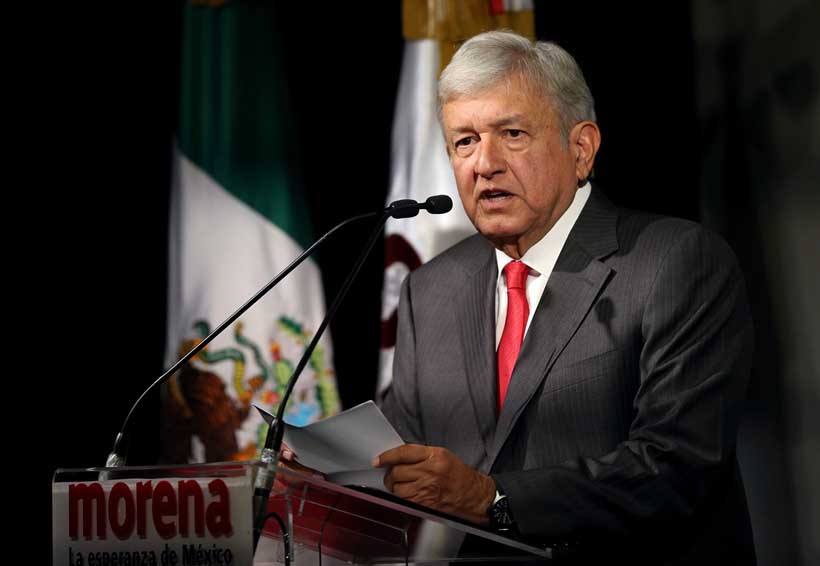“Los consumidores definitivamente han dado un voto positivo a los resultados electorales”, dice el economista
por Mexico News Daily
El índice de confianza del consumidor de México se disparó bruscamente en julio a su nivel más alto en más de una década, inmediatamente después de Andrés Manuel López Obrador, conocido como AMLO, ganó una victoria abrumadora en las elecciones presidenciales.
El índice subió un 14.8 por ciento el mes pasado, el Instituto Nacional de Estadísticas (Inegi) ayer, para alcanzar los 101.7 puntos.
La fecha del análisis fue 90 por ciento de los analistas encuestados por la agencia de noticias Bloomberg y el más alto desde marzo de 2008 cuando alcanzó 102.3 puntos.
El único aumento comparable en la confianza del consumidor se produjo en febrero del año pasado cuando el índice aumentó en poco más del 13 por ciento.
Sin embargo, el resultado fue al siguiente gasolinazo de enero de 2017, cuando los precios del combustible aumentaron bruscamente para dar un gran golpe de confianza.
“Definitivamente, los consumidores han dado un voto positivo a los resultados electorales”, dijo Joan Enric Domene, economista de la firma de corretaje Invex Casa de Bolsa.
“La gente aún no ha visto una mejora sustancial en su calidad de vida, pero están contentos con el resultado”.
El índice también subió un 17.8 por ciento en comparación con julio del año pasado.
The Inegi data is based on the National Consumer Confidence Survey that the institute carries out during the first 20 days of each month in conjunction with the Bank of México.
Confidence about Mexico’s economic outlook over the next 12 months increased by 31.9 percent compared to figures from the previous month, the biggest single-month jump recorded in the history of the survey.
Respondents’ confidence in their own purchasing power over the next year also increased, albeit by a lesser 11.3 percent.
The percentage of people who said they currently had plans to buy furniture, a television, a washing machine or another domestic appliance increased by13 percent compared to June figures.
The peso has also fared better since López Obrador’s election, appreciating 6.3 percent against the US dollar. A greenback currently buys just over 18.5 Mexican pesos.
Following his July 1 triumph, the president-elect and his prospective cabinet sought to calm fears surrounding the next government’s economic plans, a move which analysts believe has reassured investors and contributed to the peso’s strong performance.
Although household consumer confidence is up, Domene said that the same confidence hasn’t manifested itself in the business community.
“There are loose ends that the private sector is waiting to see tied up by this new government,” he said.
“Surely, in the next few months, investment from the private sector will be more reticent than consumer spending.”
López Obrador will take office for a six-year term on Dec. 1.
Source: El Financiero (sp), Bloomberg (en).
In other Mexican news:
New labor secretary will push to raise minimum wage, doubling it in the north
The wage is currently seven pesos below the threshold set by the federal government for well-being
The new government’s nominee for labor and social welfare secretary has pledged that Mexico’s next government will work toward increasing the minimum wage, and even double it in the north of the country.
The current daily minimum wage is 88.36 pesos (US $4.72), seven pesos below the threshold set by the federal government for well-being.
Luisa María Alcalde told broadcaster Radio Fórmula yesterday that she will approach Mexico’s central bank to discuss the issue.
The Mexican Employers’ Federation, or Coparmex, pushed hard in late 2017 for an increase in line with the well-being level set by Coneval, the social development agency, and it is doing so again now.
Coparmex head Gustavo de Hoyos said today he would like to see the wage raised to at least 100 pesos by the end of the year, observing that he had met with Alcalde and found there were commonalities regarding an increase in line with a level established by the United Nations.
He also said it was “one of those subjects in which we concur significantly with the new president” and hoped the agency that sets the wage would meet soon so as to finish the year with a wage possibly as high as 102 or 103 pesos.
Meanwhile, Alcalde also spoke yesterday regarding the plan to move the Secretariat of Labor and Social Welfare to León, Guanajuato, one of several departmental moves planned by López Obrador.
She said there was no hurry nor a set timeline but didn’t rule out the possibility that the department might have shifted there by the start of next year.
Alcalde also said she was aware of the constraints raised earlier in the week by Guanajuato Governor Miguel Márquez, who warned that the state doesn’t have the necessary infrastructure to accommodate the move and resulting influx in population.
She said the incoming administration was aware of the limitations.
“Of course, we understand that there could be certain problems so the idea is that it [the move] is going to be gradual,” she said.
“I don’t think that there will be any problem and we’re going to convince [the governor] that, on the contrary, this is an idea that intends there be development in the whole country, so that not all the secretariats are centralized, which will help make growth more even across the nation’s territory,” Alcalde explained.
El profesor de derecho de 30 años y ex diputado federal ha publicado varios artículos que abogan por salarios más altos en México.
La integrante más joven del gabinete de López Obrador será la encargada de presentar el esquema de aprendizaje llamado “Jóvenes construyendo el futuro”.
Alcalde dijo que el programa será fundamental para el plan del nuevo gobierno de proporcionar oportunidades de empleo a los jóvenes del país.
López Obrador y su gabinete tomarán posesión el 1 de diciembre.
Fuente: Milenio ( sp ), El Universal ( sp ) .



